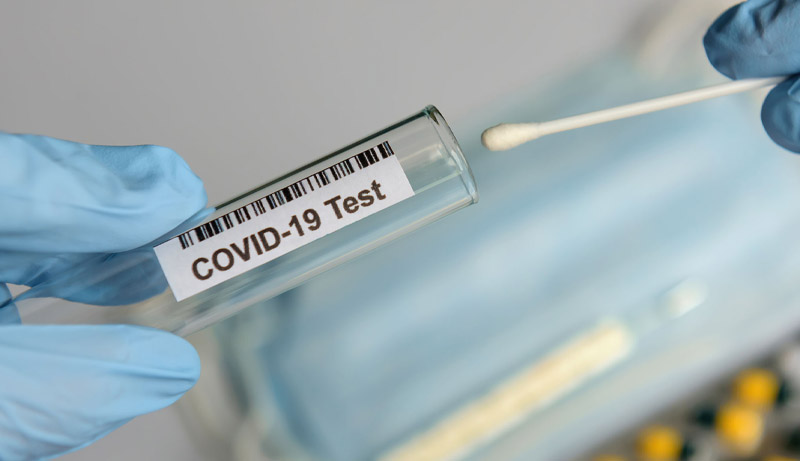Which COVID 19 Test Should You Get?

The pandemic, COVID 19, its vaccine and testing are constantly in the news. But do you understand how the tests work and which is the most appropriate for you?
How the PCR Test Works
Dr. John Kulin, DO, FCUCM, physician at Shore Urgent Care in Northfield explained the differences in the two basic COVID 19 tests – the PCR test and the antigen test. Dr. Kulin said the COVID Polymerase Chain Reaction or PCR test is a laboratory-based molecular test that is the gold standard for COVID testing. “It is the most accurate form of testing we have readily available. The PCR detects the virus’s genetic material,” said Dr. Kulin. “Results take from 36 hours to 7 days to return from the lab.”
Understanding the Antigen Rapid Test
Dr. Kulin went on to explain the rapid test, or COVID antigen test, is what is called a Point of Care (POC) test. “The antigen test looks for specific proteins on the surface of the virus. It can be done in any office or urgent care setting that is licensed to perform POC testing.” Dr. Kulin explained that can provide rapid results, in roughly 15 minutes, but states, “The antigen test is not as accurate overall as the PCR test.”
When Should a Person Be Tested?
“People should be tested as soon as they develop COVID-19 symptoms or if they have had a high risk exposure to someone diagnosed with COVID,” according to Dr. Kulin. “A high risk exposure is defined as being exposed to a person with known suspected COVID 19 and has close contact exposure.” According to the Centers for Disease Control and Prevention, close contact exposure is defined as being within 6 feet for a total of 15 minutes or more over a 24-hour period.
Exposure to an individual would include the two days before they began to show COVID 19 symptoms or if they have no symptoms in the two days prior to testing. Dr. Kulin suggests it is best to wait three to five days after a suspected high risk exposure to get tested, which will increase the likelihood that the test will give a valid result. Testing too soon, like someone running to be tested the day they are exposed, will probably lead to a negative result because the viral particles will not have been replicated enough at that point to be detected.
What is the Most Effective?
The PCR test is the most accurate and effective in all people, according to Dr. Kulin. The antigen testing has proven to be almost as accurate in patients who have two or more symptoms and are tested within the first five days of symptoms.
The PCR or molecular test is much more sensitive at picking up the presence of the virus in asymptomatic people. For those patients without symptoms, Dr. Kulin said the antigen test is much less sensitive, meaning there is a higher percentage of false negative tests. “Your ordering medical provider will assess each person’s symptoms, exam and exposure risk when deciding which test is the best to order,” added Dr. Kulin.
Reason for a False Testing Result
Not obtaining a good or proper sample is the most frequent reason for a false negative COVID test result. The PCR test requires a specimen to be obtained from the back of the nose to be accurate, according to Dr. Kulin. He added that false positives are a part of all testing as well and related to the testing type.
The Difference Between Seasonal Flu and COVID 19
COVID 19 and seasonal flu symptoms are very similar and people can contract both at the same time. Dr. Kulin explained that both COVID 19 and the flu can have varying degrees of signs and symptoms, ranging from being asymptomatic with no symptoms to severe symptoms.
Common symptoms that COVID 19 and flu share include: fever and chills, cough, shortness of breath or difficulty breathing, fatigue, sore throat, runny or stuffy nose, muscle pains or body aches, headache and some people may have vomiting and diarrhea, though this is more common in children than adults. “COVID 19 seems to cause more serious illnesses in some people,” said Dr. Kulin. “Other signs and symptoms of COVID 19 that differ from the flu may include a change or loss of taste or smell.”
What’s the Hold Up?
The sheer volume of testing being done right now is slowing down the process and is the main reason it is taking so long for the results to be returned for COVID 19 testing. “The national labs have been overwhelmed. There are also supply shortages including testing swabs and viral transport media,” said Dr. Kulin. He added that Shore Urgent Care has been lucky to have a relationship with a New Jersey-based lab that typically been returning results in 48 hours or less.
For more information on COVID testing at Shore Urgent Care, click here.
Shore Urgent Care, located at 2605 Shore Road in Northfield has newly expanded hours 8 a.m.-8 p.m., Monday through Friday, 9 a.m-5 p.m. Saturday and Sunday. Drug screenings are available Mon-Fri. 10 a.m.-5 p.m.